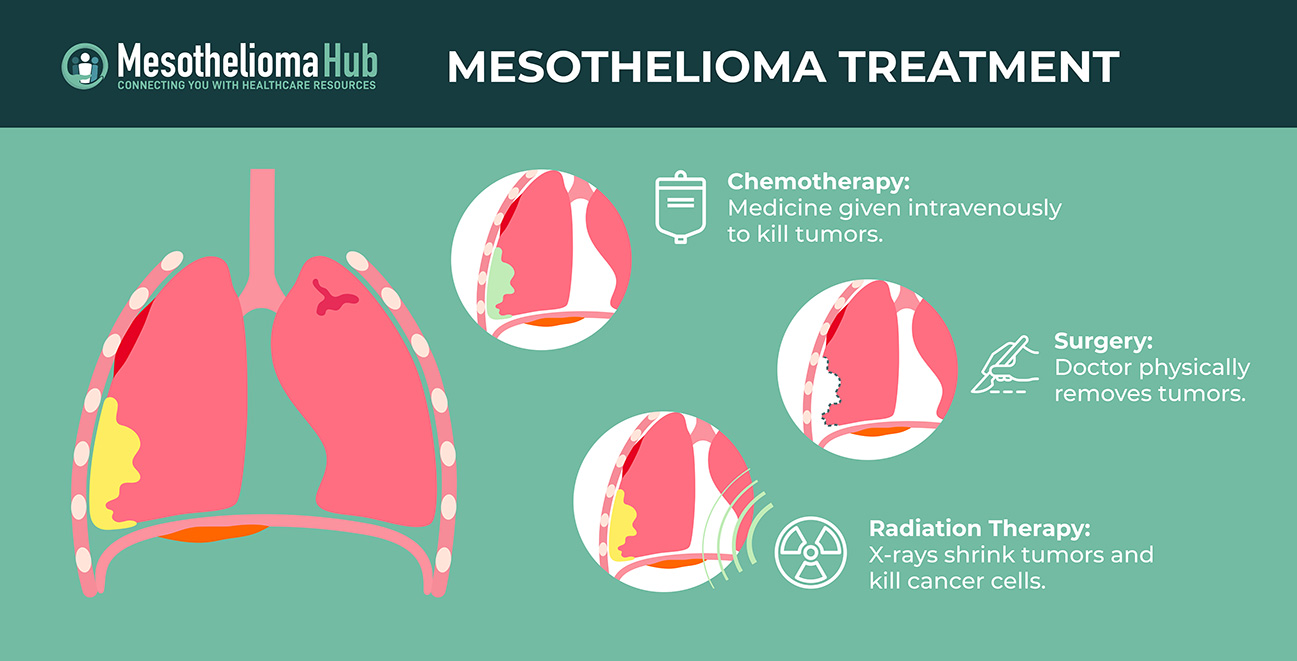Treatment
Mesothelioma Treatment
Treatment for lung cancer, a type of cancer that forms in the lungs and is the leading cause of cancer-related deaths worldwide, can vary depending on factors such as the cancer stage and cell type, patient age, and overall prognosis. After a lung cancer diagnosis, the best forms of treatment are discussed between you and your care team.
Medically Reviewed by: Alicja Gruszka, MD PhD | February 13th, 2024
Get Free Mesothelioma Guide

Treatment Information for Mesothelioma
Navigating through mesothelioma treatment options can be a complex journey, as the recommended course of action depends on various factors unique to each individual. Factors such as the location of mesothelioma, the disease’s stage, the patient’s overall health, and treatment history play a pivotal role in shaping the personalized treatment plan crafted by doctors. When a doctor develops a treatment plan for their patient, the details hinge on several factors that differ with each individual. These factors include:
- Location of mesothelioma (pleura, peritoneum, pericardium)
- Stage of disease
- Patient’s overall health
- Treatment history
- Type of Mesothelioma
If you develop and are diagnosed with any of these diseases from exposure to asbestos or another toxic substance (or for any other reason), talk to an oncologist about what their recommendations may be for therapy. Each patient will have a different prognosis that can potentially be improved.

Mesothelioma Advocates
Kelsey Staub

How is Mesothelioma Treated?
Doctors and researchers have tested and developed three primary modes of treatment for mesothelioma patients, surgery, chemotherapy, and radiation. These therapies can be used alone or in conjunction at different intervals and levels, also known as multimodal therapy. Additionally, the doctor may choose to administer these treatments curatively (to try and cure the disease) or palliatively (to relieve symptoms).
1 ) Surgery for Malignant Mesothelioma
A doctor may recommend surgery to completely remove the tumor by making an incision and removing the affected tissue with a surgical tool. If the surgeon can’t remove all of the tumors, chemotherapy or radiation may be administered to kill the remaining tumor cells.
There are a few ways a surgeon may choose to treat a mesothelioma patient, such as Debulking, which is the reduction of as much of the bulk (volume) of a tumor without the intention of completely eradication. If the patient has tumors on the lining of the lungs (pleural space), the doctor may choose a pleurectomy. When tumors develop in the lining of the abdomen (peritoneal area), then the surgeon may recommend a peritonectomy. When tumors are in the lining of the heart (pericardial), treatment options are severely limited due to the tumor’s sensitive location and proximity to a major organ, but surgery can sometimes be applied.
2) Chemotherapy Treatment for Mesothelioma
Sometimes called ‘chemo,’ chemotherapy involves the utilization of anti-cancer medications injected or orally into the body. Depending on the location and progression of the tumors, a doctor can choose to administer the drugs to a patient in many ways. The most common way is intravenous, which involves the doctor injecting the medications through a vein.
A nurse, following the doctors’ orders, will administer chemotherapy medication through the vein to a specific area (regional chemotherapy) or throughout the entire body (systemic chemotherapy). Medications are commonly administered together before or after surgery. Newer targeted methods are being developed that aim to reduce chemotherapy side effects by directing the anti-cancer drugs to specific regions, but they’re currently being tested in clinical trials.
3) Radiation Therapy for Mesothelioma
Doctors can use high-energy X-rays to attack tumors deep within the body. There are two primary types of radiation treatment external beam radiation therapy (EBRT) and brachytherapy. Brachytherapy is a type of radiation therapy in which a sealed radiation source is placed inside or next to an affected area requiring treatment.
There are also several subtypes that differ based on how the doctor administers the radiation beams and what types of beams are used. It can be challenging to focus the beams on mesothelioma tumors because they tend to grow and spread, so this mode of treatment is generally used after surgery or chemotherapy to try to kill the remaining cells.
4) Targeted Therapy Mesothelioma Treatment
Targeted therapy medications function differently than other medications because they can target specific cells versus other anti-cancer drugs that tend to affect all cells, even healthy ones.
These treatments are much newer than the previous 3 modes of therapy for malignant mesothelioma. Still, due to success in clinical trials, they have become more common in current patient treatment plans. Still not tested enough to be considered primary, targeted therapies will soon be considered standard anti-cancer therapy due to the lack of adverse reactions from medications since they can be focused on a specific area. Immunotherapy is the most common type of targeted treatment doctors use in cancer patients today.
Preparing for Mesothelioma Treatment
There are a few helpful things you can do to help better prepare for cancer treatment. One major detail is to ensure you understand everything that’s happening during in your mesothelioma treatment.
Don’t be afraid to ask your doctor more questions about any aspect of your treatment, diagnosis, prognosis, or post-treatment, among other things. You’re also entitled to a second opinion with a different oncologist if you wish. Other ways to prepare include to:
- Tell your doctor everything: Make sure to fully disclose any additional medication or supplements you have, may, or are considering taking during any stage of the treatment process. This can severely affect how your body reacts to any therapies your doctor may choose to administer. Keeping secrets is a granted way to receive bad treatment advice.
- Have someone on call: Just in case there are any complications or your reaction to treatment is too difficult to manage, have a family member or friend readily available to step in. This could be to assist for several reasons besides emergencies, like grocery shopping or a ride to the doctor’s office. If you don’t have help available, talk to the hospital and see what arrangements can be made on your behalf for a caregiver or hospice.
- Get your home ready: Sometimes during or after treatment a patient may be in a lot of pain, feel they need to sleep a lot, be really weak, or otherwise be impaired. It can be helpful to ready your home accordingly and put hard-to-reach necessities in one easy location. Survey your entire home. Check the fridge. Are you stocked on groceries? Toothpaste? Making a list helps.
- Take care of yourself: Before, during, and after treatment, it’s important to help your body be as healthy as possible. Since your body must fight off the tumors and withstand adverse reactions from therapy, trying to get enough sleep, eating healthy food from a healthy diet, and getting an appropriate amount of exercise can help the process monumentally.
Ask us how to get mesothelioma treatment.
Evaluate My Case
Different Therapy Phases for Mesothelioma
There are 3 phases of cancer therapy, neoadjuvant, surgery, and adjuvant. Neoadjuvant therapy consists of all treatments and therapies the doctor chooses to administer before the primary, while adjuvant encompasses all regimens the doctor administers after primary treatments. Tumors developing in the pleura versus other locations allow the doctor a different set of treatment options. Modes of treatment generally administered to pleural mesothelioma patients include surgery, chemotherapy, and radiation. Sometimes, these are combined with newer treatments like immunotherapy.
Methods that surgeons generally perform on pleural mesothelioma patients include pneumonectomy, pleurectomy, and partial pleurectomy.
- Extrapleural Pneumonectomy (EPP) is a pulmonary operation that involves removing the affected lung, part of the heart lining, the diaphragm, and the chest lining. This procedure is complex and difficult to perform and is only performed on patients with early-stage pleural mesothelioma that’s localized (on one side of the lungs).
- Pleurectomy and Decortication (P/D) – Surgery that removes part of the lining of the lungs, chest, and some of the lung surface. There are many differences between EPP and P/D.
- Debulking (partial pleurectomy) – Also primarily a palliative surgery option, debulking involves removing or reducing part of the tumor.
Pleural Chemotherapy
Researchers are still discovering other methods to administer chemotherapy medications to greatly reduce adverse reactions from the chemotherapy drugs in the bloodstream. Hyperthermic intrathoracic chemotherapy (HITHOC) has been proving helpful in the treatment of pleural mesothelioma.
- Hyperthermic Intrathoracic Chemotherapy (HITHOC) – Involves utilizing heated chemotherapy medications and applying them directly to chest tissues to kill small and hard to see tumors. Researchers have discovered that hyperthermia (a condition where internal temperature is much greater than average) causes cell death, so applying heated anti-cancer medications to the affected area has a doubled effect.
Pleural Radiation
This therapy for pleural mesothelioma patients has two main types, 3D- CRT and Intensely Modulated Radiation Therapy (IMRT) Both of these are subtypes of external beam radiation.
- Three-dimensional conformal radiation therapy (3DCRT) – A form of EBRT that positions radiation beams from different directions that are designed to fit the tumor. Adverse reactions are lessened since the radiation is more concentrated on the affected area.
- Intensely Modulated Radiation Therapy (IMRT) – Like 3D CRT, IMRT involves a more controlled beam of modifiable by strength adjusted to the shape of the tumor, further reducing the harmful effects of radiation.
Peritoneal Mesothelioma Treatments
The peritoneum refers to the lining in the abdomen that surrounds the organs. Tumors in or around the abdomen are harder to treat with radiation because they can cause too much damage. Surgery and chemotherapy are more common choices when a person is diagnosed with this mesothelioma type.
- Peritoneal Surgery – A doctor most likely chooses a cytoreductive surgical plan for someone with peritoneal mesothelioma. This involves a series of surgeries that remove parts of specific organs in the body. For peritoneal mesothelioma, an omentectomy and peritonectomy are forms of surgery commonly selected. Sometimes a series of one or both will be recommended. Researchers are developing more efficient methods of both types of cytoreductive surgeries in clinical trials.
- Omentectomy – An omentectomy is the removal of the part of the perioteum known as the omentum. This area encompasses tissues that cover the stomach and liver as well as around the intestines. It can be used to treat a range of tumors in this region, from peritoneal mesothelioma to ovarian cancer and more.
- Peritonectomy – This surgery operates specifically on the tissues around the peritoneal space. A doctor may choose to administer both types of surgery if the tumors spread too far.
- Hyperthermic intraperitoneal chemotherapy (HIPEC) – HIPEC is a form of chemotherapy that has shown positive results in combination with cytoreductive surgery approaches. When a doctor administers chemotherapy through hyperthermic intraperitoneal means, they are using heat to administer the drug. HIPEC works by administering chemotherapy-heated (hyperthermic) medication directly into the abdomen (intraperitoneal) instead of intravenously in the bloodstream. This reduces harmful effects and is far less toxic than other methods. This is because when chemotherapy drugs are heated to over 106-108 degrees Fahrenheit, cancer cells react poorly and are forced into cell death, while healthy cells have less trouble handling the heat.
Pericardial Mesothelioma Treatments
Since pericardial mesothelioma involves tumors around the lining of the heart sac, this area is very sensitive and hard to treat. A Pericardiectomy is a surgical procedure that removes parts or all of the pericardium. Radiation usually does too much damage, so this treatment mode is usually not selected for pericardial mesothelioma patients. For this reason, chemotherapy can also be difficult for doctors to administer safely to patients. While numerous cases of pericardial mesothelioma are inoperable, surgery is still a primary treatment of choice for this disease.
Palliative Care for Patients Receiving Mesothelioma Treatment
Pain management is the main focus of palliative care and is generally recommended for late-stage patients. The care provider is also trained to recognize psychological disorders that may develop and assign treatment or therapies accordingly. If a patient is too late in their stage of mesothelioma, primary modes of treatment may be utilized for palliative care only. Types of palliative treatments for mesothelioma include:
- Palliative Radiation – For palliative care, radiation is utilized to shrink tumors to reduce pain in the affected area.
- Pleurodesis – Pleurodesis involves the removal of fluid buildup in the pleural space.
- Paracentesis – A treatment that removes excess fluid from the abdominal space is paracentesis.
- Pericardiocentesis – Fluid in the pericardium will be removed by pericardiocentesis.
What Are Alternative and Complementary Mesothelioma Treatments?
Targeted therapies like immunotherapy are considered new and emerging treatments but are the most successful ones currently. Recently, in first-line treatment, immunotherapy combining nivolumab with ipilimumab has been shown to be superior to chemotherapy in the CheckMate-743 study in terms of overall survival (18.1 months), leading to its approval by the FDA and EMA (PMID: 38136333). Some specialty centers administer these types of emerging therapies, but most of the time, clinical trials are the best way to find other new treatment options that may not be as available to the public as immunotherapy.
Alternative and complementary therapies aren’t scientifically backed and proven to work, but some people have reported improvements in their prognosis, physical health, or outlook. Additionally, they’re never meant to replace primary treatments and should always be discussed with a doctor beforehand. Some therapies include:
What to Do About Mesothelioma Treatment Costs
In the United States, costs to treat mesothelioma can add up. In 2014, enough data was gathered to average the mean cost of treatment per hospitalization to $24,124. It can also greatly exceed this number when multiple treatments are added in. This doesn’t include out-of-pocket expenses for complementary therapies or some clinical trials or loss of income from having to take off work.
Contact our patient advocates for a case evaluation if you were negligently exposed to asbestos or other toxic products at work or otherwise. Any money gained from a potential legal case can offset or completely cover the costs of treatment and any financial loss that may come from having to leave your job.
Mesothelioma Support Team
Mesothelioma Hub is dedicated to helping you find information, support, and advice. Reach out any time!
